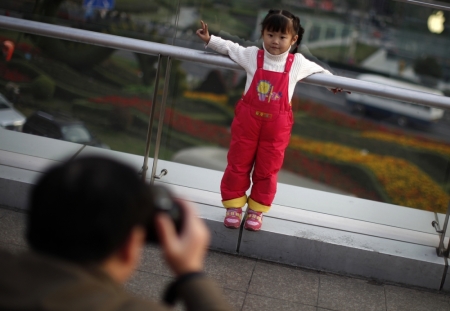China to Ease One Child Policy and End Labor Camp Program
China's official government news agency announced Friday that the county will be loosening its controversial One Child Policy, as well as end its equally controversial re-education through labor program. These announcements come after top communist leaders met in Beijing for four days of closed meetings to design the country's future over the next 10 years.

The new policy reached by communist officials will allow families in which one parent is an only child to have two children, the country's official Xinhua News Agency said in a policy document released Friday. The previous policy only allowed two children per family if both parents were only children. The country's controversial One Child Policy was enacted in 1979 as a method of population control, but critics stipulate that as the country seeks to move ahead economically, it may have chosen to loosen its policy to allow a population surplus.
"Until now, the growth of the Chinese economy has been propelled by a demographic surplus, and that has been turning into a demographic deficit," Steve Tsang, a professor of Chinese studies at the University of Nottingham, told The Guardian regarding the policy change. Tsang added that the change in policy "should lead to a significant reduction in the abuse of human rights, in terms of forced termination."
"This is still a very, very, very big issue, and it is one of the most regular abuses of human rights that happens in China," the professor added.
Experts speaking to USA Today argue that China's One Child Policy change was not carried out through compassion, but rather demographics. He Yafu, China demographer, told the media outlet that the country's elderly population is growing faster in recent years, therefore threatening to disrupt demographic stability unless the policy is changed.
During the closed-door meetings, Beijing officials also decided to eliminate the country's controversial re-education through labor program. The program allowed police officials to detain people for up to four years without a conviction for their alleged crime. The program was initially used to detain anti-communist revolutionaries by subverting the legal system, but nowadays it is more often used for detaining petty offenders such as prostitutes, and those who do not express the same religious or political values of the state.
"Labor camps were a tool of the police, used against religious groups, political dissidents, anyone they wanted and in terms of rule of law, it was incredibly damaging to the integrity of the criminal law system," Nicholas Bequelin of Human Rights Watch in Hong Kong told The Wasington Post.
Additionally, Beijing lawyer Pu Zhiqiang told the Christian News Network that the abolishing of the labor camps means progress for China. "There have been many methods used recently by this government that are against the rule of law, and do not respect human rights or freedom of speech," Pu said. "But by abolishing the labor camps […] it makes it much harder for the police to put these people they clamp down on into labor camps," he said.
Christian human rights groups are also applauding China's recent move, as the country has long been critcized for persecution against those of the Christian faith, causing many religious groups to form networks of underground "house churches." Additionally, China has faced rebuke from the pro-life movement over its One Child Policy, as often times the strict policy has led to families aborting unwanted baby girls, and has led to accusations of forced abortions being imposed on women.
According to the Christian News Network, since 1971, the Chinese government has performed about 336 million abortions.





















